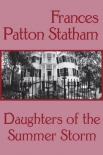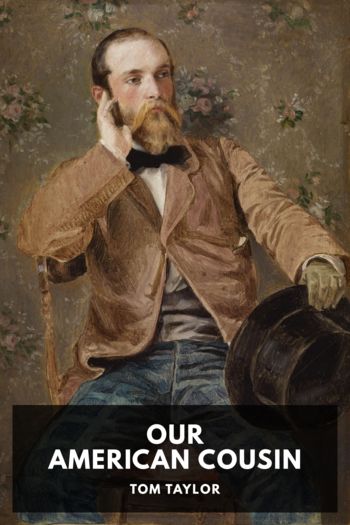Daughters of the Summer Storm by Frances Statham (best sci fi novels of all time .TXT) 📗

- Author: Frances Statham
Book online «Daughters of the Summer Storm by Frances Statham (best sci fi novels of all time .TXT) 📗». Author Frances Statham
From the canoe, Maranta could not distinguish the jatai trees from any of the others. For they were all a blur of green viewed through the steady drizzle of rain.
It was such a small thing to be annoyed about. But all day Maranta had experienced the discomforts of traveling, without really seeing much of the countryside. Earlier in the journey, Dona Isobel had told her how the Indians made their canoes from the bark and even took the resinous substance from the roots of the jataí trees to burn in their lamps. How she wished she were in the same canoe with Dona Isobel. Then, she could talk with her along the way.
But Ruis had arranged their seating. And once again, Maranta was paired with the arrogant, silent conde.
Her leg grew numb, and she tried to change her position. Immediately, the conde turned his head. "Be still, Maranta. We are entering a dangerous section of the river. And I do not wish to fish you out of the water if the canoe should overturn."
Again, she stared at his back and sank to the same uncomfortable position, afraid to move because of his warning.
Tents, horses, carts, and all manner of supplies followed behind them in separate boats. And alongside them were additional canoes rigged with guns, manned by alert guards.
As the rain gradually subsided, Maranta kept her eyes on the nearer bank, certain that she saw lurking figures watching their progress. But she was mistaken. It was only a group of anthills in the distance. And recognizing them, she relaxed.
She remembered that Dona Isobel had told her that once a priest had excommunicated a group of ants because they had eaten up an altar cloth. Without realizing it, Maranta laughed aloud.
"You find the trip amusing, menina?" the conde asked. As he turned his head and waited for her answer, the cold water dripped from his hat onto his soaked poncho.
Maranta felt as if she had been reprimanded by Father Ambrose, his look was so stern.
"I was thinking of a story that Dona Isobel told this morning," she said, her smile no longer on her lips.
"So?"
Was that an invitation for her to relate it to him? Maranta grew visibly smaller under the heavy black cloak.
"I do not think it would amuse you," she apologized.
He shrugged his shoulders and turned around. Again, Maranta gazed at his broad, unbending back that obscured her view.
They made camp for the night not far from the riverbanks. The men strung their hammocks between trees, extending a circle around the two tents that they set up for the women.
Small and cramped, the tents were only large enough to cover two hammocks and no more. And so it was that Dona Isobel was alone in one tent, while Maranta shared the other with the condessa.
Maranta was glad that she did not have to be alone, like Dona Isobel. She was still frightened from seeing the huge snake swimming in the river that afternoon and overturning one of the canoes loaded with supplies.
What a terrible sight, seeing it thrash in the water when the guards turned their guns on it. She had felt the shakiness of their own canoe in the waves that the snake had generated. What if it had been their canoe instead that had overturned? Now, Maranta knew why the conde was so stern with her when she moved about. There was no telling what was lurking under the water.
But he was still overbearing—forcing the women to get ready for bed much earlier than usual and bringing the water into their tents for the nightly footwashing because of the chiguas that could burrow underneath the toenails and cause painful swelling of the feet.
It was not even dark yet—and Maranta could hear the men laughing and talking a short distance away, where the mules and horses were corralled.
Dona Isobel came into the condessa's tent to help her. Since there was not enough room for the three of them, Maranta slipped out to put water in Fado's cage, which hung in a tree immediately outside the tent. When that was done, Maranta forgot about the bucket on the ground and stumbled against it, spilling the rest of the water. In exasperation, she stared down at the ground, as she righted the empty bucket. Now, there was no water to wash in. And Maranta, afraid of what the conde would say if she requested more water, decided to go to the river herself. It would take only minutes. She would be back before anyone missed her.
Maranta walked carefully past the campfire where they had cooked their supper—black beans and rice, with fresh fish. Between empty hammocks she went, with the bucket over her arm. She could still hear the men laughing and talking and could smell the odor of tobacco that wafted through the air. Soon she was at the water's edge. Gathering up her skirts, Maranta knelt to fill the container with river water.
The sky, in that brief period between twilight and total darkness, was aflame with wisps of gold and purple, and as she stood up, she observed its beauty with her artist's eye, capturing the scene for some future painting.
Ruis had not mentioned the pigments or brushes again. Maranta hoped they were packed in one of the crates in the canoes. But what if they had been in the crate that was lost that afternoon on the river?
Maranta frowned as she walked back toward the camp. There was no sound from the men in the distance. And the shapes of the trees and shrubs—no longer highlighted by the last rays of the sun—loomed before her.
Maranta increased her pace. She had lingered far too long at the river. The landscape had lost its sense of peace and beauty and was now





Comments (0)